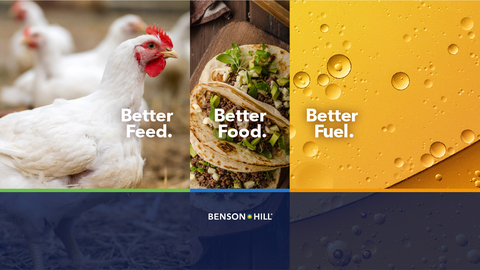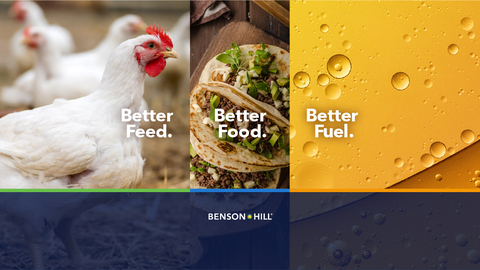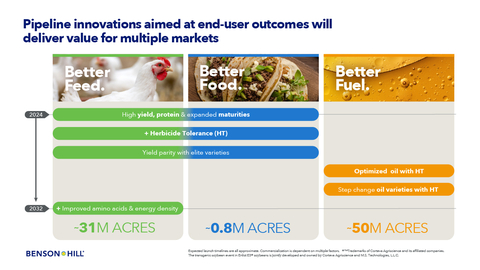ST. LOUIS--(BUSINESS WIRE)--Benson Hill, Inc. (NYSE: BHIL, the “Company” or “Benson Hill”), a seed innovation company, today shared further advancements in its innovation pipeline to deliver advantaged traits for end users in larger soy markets, including animal feed, soybean oil, and biofuels. These innovations, many of which are in field testing now, uniquely position Benson Hill to redefine U.S. soy for feed and fuel with new varieties that provide novel benefits across the agribusiness value chain.
“No other seed company is focused on soy quality traits for specific end markets,” said Deanie Elsner, Chief Executive Officer of Benson Hill. “With the depth of our soybean data, our proprietary soy germplasm, and the millions of data points we analyze, we believe we can solve problems for the soy end user with unmatched precision and speed. Whether we are creating more nutritious soybean meal or delivering improved oil, Benson Hill is poised to elevate the standard for U.S. soy over the next decade.”
The Company’s focus on optimizing yield, protein, and oil in the soybean genome addresses the disconnect between current soy composition and its intended uses. For example, ‘dual value beans,’ soybean varieties that can simultaneously deliver improved soybean meal with either better quality oil for consumption or improved oil for the emerging biofuels market, are advancing rapidly in Benson Hill’s pipeline alongside product candidates that push the limits of protein and yield.
“The rate at which we’ve increased yield, boosted protein, and expanded maturity zones since 2019 is far beyond what I have seen in the industry and is a direct result of our technology and focus,” said Jason Bull, Chief Technology Officer of Benson Hill. “Our upcoming innovations are designed to hit purpose-driven outcomes such as better digestibility, higher feed energy density, and improved oils. We believe these technology advances will create significant value downstream.”
To fully unlock that value, Bull outlined three focus areas for Benson Hill’s pipeline through 2032:
| 1. | Enhance varieties for near-term impact in animal feed (projected launches in 2024-2027): By increasing the yield potential and expanding geographic maturities for its proprietary genetics grown across the U.S., Benson Hill can deliver better soybeans for feed applications such as poultry by increasing the protein and metabolizable energy. Benson Hill recently validated the benefits of its proprietary soybean meal with industry leader Perdue Farms. Bull expects the expanded maturities in the Company’s innovation pipeline to allow more soybean farmers and seed partners to utilize its proprietary portfolio. |
|
|
||
As shared in its Q1 earnings update, the Company will continue to pursue broadacre expansion in feed and fuel and expects to broaden its soybean portfolio to approximately 35 varieties by 2025. Non-GMO, Ultra-High Protein Low-Oligosaccharide (UHP-LO) soybean varieties, destined for animal feed, are expected to yield on par with elite GMO commercial varieties by 2026-27, with herbicide-tolerant varieties now slated for 2026, a year earlier than previously communicated. Incorporating herbicide tolerance will provide easier weed control and enable large-acre adoption of Benson Hill UHP-LO varieties in the coming years. |
||
|
||
| 2. | Improve oil for biofuels and crude oil soy markets (projected launches in 2028-2030): Benson Hill is also gearing up to introduce a range of soybean varieties for biofuels and crude oil applications by the end of the decade. Using years of field testing and genomic data, researchers recently identified promising variety candidates in the pipeline that could serve a total addressable domestic market of approximately 50 million U.S. soybean acres. This initiative underscores the Company’s commitment to sustainability and highlights how soybeans can play a role in advancing renewable energy solutions. |
|
|
||
| 3. | Further expand value creation for animal feed with new soy quality traits (projected launches in 2032 and beyond): Looking further ahead, Benson Hill is aiming to expand value creation in animal feed with high-yielding soybean varieties that will feature higher energy density, better protein quality, improved oil, and reduced anti-nutritional factors, which can deliver significant downstream benefits for the animal feed industry. |
The strategic advantage for Benson Hill’s soybean seed advancements lies in its proprietary genetics, CropOS® and the Crop Accelerator. Today the Company offers 22 commercial soybean varieties leveraging world-leading germplasm it acquired in 2019. CropOS, its AI-driven technology platform, unlocks the discovery of new traits with a dynamic data lake of agronomic and genetic information. Since 2021, more than 24,000 candidate soybean varieties have been designed and advanced through CropOS, using billions of data points that inform a predictive breeding success rate that rivals top competitors. Benson Hill’s Crop Accelerator, a state-of-the-art rapid prototyping facility, has enabled plant breeders to complete more than 200 crop cycles since the facility opened in 2021. These differentiated core technologies, along with CRISPR gene editing approaches have led to more than 150 gene edits to date, equip Benson Hill to make gains in protein, oil, and end-use traits and stay at the forefront of soy seed innovation.
Scientific advisors, who regularly review the advancement and application of these technologies, have validated Benson Hill’s competitive edge.
“What Benson Hill has accomplished by combining state-of-the-art computational prediction, best-in-class molecular marker technology, and the Crop Accelerator technology, and making this the center of how they do plant breeding, has allowed them to make genetic gains on complex traits at rates unachievable only a few years ago,” said Jon Lightner, former Chief Scientific Officer for Genus PLC and a founding member of the Benson Hill Scientific Advisory Board (SAB). “It is genuinely revolutionary.”
Gary Fogel, SAB member and Chief Executive Officer of Natural Selection, Inc. agreed, “Benson Hill continues to impress using artificial intelligence and machine learning for predictive modeling in plant breeding. These approaches offer rapid computational screening of hundreds of thousands of possible plant development paths, leading to biological insights, and maximized market opportunity. Novel predicted outcomes are evaluated at an incredibly fast pace prior to going to the field. This overarching innovation pipeline revolutionizes trait discovery in plants as part of an unparalleled, holistic go-to-market strategy.”
About Benson Hill
Benson Hill is a seed innovation company that unlocks nature’s genetic diversity in soy quality traits through a combination of its proprietary genetics, its AI-driven CropOS® technology platform, and its Crop Accelerator. Benson Hill collaborates with strategic partners to create value throughout the agribusiness supply chain to meet the demand for better feed, food, and fuel. For more information, visit bensonhill.com or X, formerly known as Twitter at @bensonhillinc.
Cautionary Note Regarding Forward-Looking Statements
Certain statements in this press release may be considered “forward-looking statements” within the meaning of Section 27A of the Securities Act of 1933, as amended, and Section 21E of the Securities Exchange Act of 1934, as amended. Forward-looking statements generally relate to future events or the Company’s future financial or operating performance and may be identified by words such as “may,” “should,” “expect,” “intend,” “will,” “estimate,” “anticipate,” “believe,” “predict,” or similar words. These forward-looking statements are based upon assumptions made by the Company as of the date hereof and are subject to risks, uncertainties, and other factors that could cause actual results to differ materially from those expressed or implied by such forward-looking statements. These forward-looking statements include, among other things, statements regarding the Company’s ability to enter new markets and the potential timing of such entry; statements regarding the Company’s expectations for an expanded innovation pipeline and additional products, additional product applications, and the projected timing of commercialization of such products; the anticipated commercial, nutritional and other benefits of the Company’s products, including any expectation that the findings associated with a recent trial can be repeated or improved upon in the future, including in broadacre application; statements regarding the benefits of the Company’s technology platforms; statements regarding the Company’s analysis of its soybean varieties, including potential applications, benefits and risk profiles; statements regarding the Company’s ability to manage and develop its product pipeline; statements regarding the Company’s plans to expand its innovation pipeline, product portfolio and acreage; statements regarding the Company’s strategy and business and growth plans; any projections of market opportunity; any financial or other projections based upon or otherwise incorporating judgments or estimates relating to future performance, events or expectations; and statements regarding the Company’s strategies, competitive positioning, resources, capabilities, and expectations for future performance. Factors that may cause actual results to differ materially from current expectations include, but are not limited to: risks associated with the Company’s ability to execute on its business strategy, including its transition to an asset-light business model; risks relating to the Company’s ability to continue as a going concern; risks associated with the failure to realize the anticipated commercial, nutritional and other benefits of the Company’s products and product candidates in a timely manner; risks associated with forecasting potential additional product applications; risks associated with successfully leveraging the Company’s technology platforms and achieving their anticipated benefits in a timely manner; risks associated with the accuracy and repeatability of feeding trials; risks associated with the Company’s liquidity improvement plans and other cost saving measures; risks relating to the accuracy of analyses, including with respect to the potential characteristics, benefits and risks of the Company’s soybean varieties and other new products; risks relating to failed negotiations with regard to strategic partners, licensing deals, and other potential transactions, including strategic alternatives; risks relating to entering new markets and growing market share; risks relating to the animal feed, soybean oil, and biofuel markets; risks relating to developing and expanding the Company’s product portfolio; risks relating to achieving acreage expansion; liquidity and other risks relating to the Company’s ability to continue as a going concern; risks associated with the Company’s ability to grow and achieve growth profitably, including continued access to the capital resources necessary for growth; risks associated with managing capital resources; risks associated with the Company’s ability to maintain relationships with its customers, suppliers and strategic partners, risks associated with changing industry conditions and consumer preferences, risks associated with the Company’s ability to retain key personnel; and other risks and uncertainties set forth in the sections entitled “Risk Factors” and “Cautionary Note Regarding Forward-Looking Statements” in the Company’s filings with the SEC, which are available on the SEC’s website at www.sec.gov. Nothing in this press release should be regarded as a representation by any person that the forward-looking statements set forth herein will be achieved or that any of the contemplated results of such forward-looking statements will be achieved, or that any anticipated timing for such statements or results will be met, including without limitation, any expectations about the Company’s operational and financial performance or achievements, and any expectations regarding the traits, benefits, or potential commercial success of the Company’s current and anticipated future soybean varieties. There may be additional risks about which the Company is presently unaware or that the Company currently believes are immaterial that could also cause actual results to differ materially from those contained in the forward-looking statements. The reader should not place undue reliance on forward-looking statements, which speak only as of the date they are made. The Company expressly disclaims any duty to update these forward-looking statements, except as otherwise required by law.





